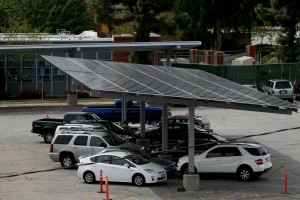
The effort to reduce environmental impacts through sustainable practices is ongoing at Citrus College.
Students are playing an important role in these efforts to be examples of what is possible at the community college level.
The Developing Energy Efficiency Professionals and campus clubs including Earth Club, Volunteer Corps and Citrus United States Green Building Council, along with dedicated faculty members Robert Goodman and Christine Goedhart are uniting with the goal of creating an ongoing sustainability movement on campus.
In April of 2012, Citrus College entered into a partnership with the California Community College Chancellor’s Office and the California Energy Commission to create the first sustainability “template” to be utilized as a guide for the state’s 112 community colleges.
The template promotes an active learning and participatory environment, where students, faculty and staff encourage and create sustainability and social awareness.
Citrus students had the opportunity to contribute to this template by attending the Sustainability Committee meetings on campus. Charity Karungari, a member of the DEEP program at Citrus College assisted in writing the template.
“This experience has enabled me to understand the unselfish reasons behind being sustainable and doing the right thing,” Karungari said.
“I worked with a remarkable and intelligent group of people with different interests joined by a common goal.”
In fall 2012, members of the sustainability committee including director of facilities and construction, Fred Diamond, assistant vice chancellor, Fred Harris and DEEP interns presented the college’s template at the 2012 Green California Community College Summit in Pasadena and received the District Leadership Award for their efforts in sustainability.
“We are extremely proud to be the recipient of the energy award,” said Citrus College superintendent/president Geraldine M. Perri, in a statement.
“We have a commitment to sustainability and have made great strides toward becoming a greener institution. Receiving recognition for these efforts is always gratifying.”
Since the completion of the template, Citrus College club leaders and DEEP interns have been present at each Sustainability Committee meeting on campus to discuss the mechanics of implementing the template.
They encourage new projects at Citrus, including new construction, water conservation, energy efficiency, and ordering recycling bins to begin a recycling program.
Andrea Zapata, Citrus College DEEP intern and president of Citrus USGBC plans to continue pushing for improvements.
“Because Citrus is a leader in sustainability in the community college system, I believe we can move forward by creating a policy that would raise the current U.S. Green Building Council Leadership in Energy and Environmental Design standard,” Zapata said.
“Although Citrus has completed targets set for the built environment, there is more to be done.”
The DEEP program at Citrus College employs student interns to promote sustainability and energy efficiency while providing green workforce exposure and real world experience.
Students are encouraged to attend events that include the Glendora Earth Day, beach clean ups, community bike rides, hikes, and field trips to the openings of local LEED buildings. LEED, as certified by the USGBC, is a green rating system developed for the built environment.
“It was a complete eye-opening experience. Working side by side with my peers and professionals allows me to understand and push my passion even further,” said Andrew Hernandez, a DEEP intern.
Last semester, Hernandez and the other DEEP interns were able to visit the Harley Ellis Devereaux offices in Los Angeles, a LEED establishment where students met one-on-one with engineering professionals and were able to take a tour of their facilities while learning about green building.
By being involved with these projects, attending club meetings, and volunteering, students are encouraged to share their passion for the environment and make a difference at Citrus College.


